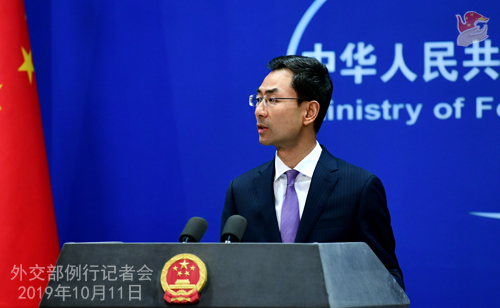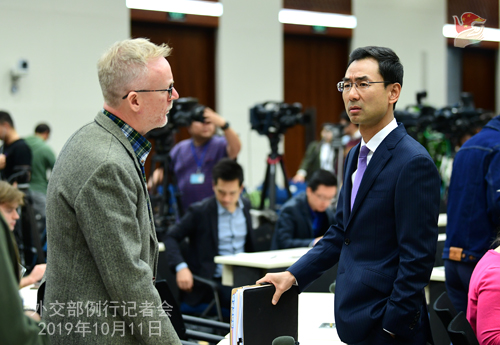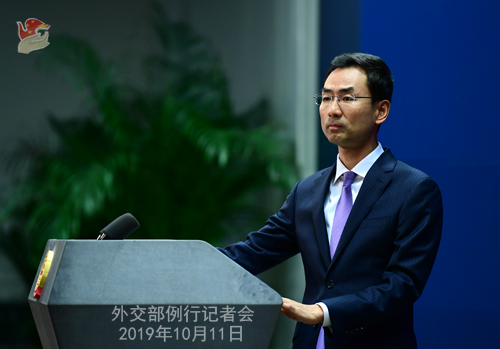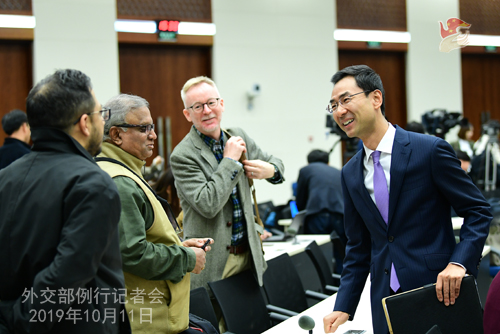| Foreign Ministry Spokesperson Geng Shuang's Regular Press Conference on October 11, 2019 |
| 2019-10-11 20:34 |
|
The 15th China-Singapore Joint Council for Bilateral Cooperation meeting, the 20th China-Singapore Suzhou Industrial Park Joint Steering Council meeting, the 11th China-Singapore Tianjin Eco-City Joint Steering Council meeting, and the third China-Singapore (Chongqing) Demonstration Initiative on Strategic Connectivity Joint Steering Council meeting will be held in Chongqing on October 15. At the invitation of Han Zheng, member of the Standing Committee of the Politburo of the CPC Central Committee and Vice Premier of the State Council, Deputy Prime Minister Heng Swee Keat of the Republic of Singapore will visit China from October 14 to 17 and co-chair the meetings with Vice Premier Han Zheng. During DPM Heng Swee Keat's visit, Vice Premier Han Zheng will meet and co-chair the aforementioned meetings with him, and hold a welcoming banquet for the delegation. DPM Heng Swee Keat will also visit Beijing and Tianjin after the meetings. Singapore is China's friendly neighbor. The two have established an all-round cooperative partnership progressing with the times and enjoy fruitful cooperation in various sectors. In particular, high-quality BRI cooperation has made visible progress. The two sides are holding the meetings to implement the two leaders' important consensus and take stock of past cooperation and blueprint future development. The two sides will hold an in-depth exchange of views over international and regional issues of mutual interest. Q: On October 10, President of the Council of State and Ministers Diaz-Canel was elected as Cuba's first ever president along with other leaders. What are China's plans to advance its bilateral ties with Cuba? A: On October 10, new state leaders including the president of Cuba were elected at an extraordinary session of the ninth National Assembly of People's Power of Cuba. China sends warm congratulations on this significant event in Cuba's history. Xi Jinping, General Secretary of the CPC Central Committee and President of China, sent messages of congratulations respectively to First Secretary of the Central Committee of the Communist Party of Cuba Raul Castro and newly-elected Cuban President Miguel Diaz-Canel, stressing readiness to make joint efforts with the Cuban leadership to continuously expand the breadth and depth of bilateral cooperation and push for steady and sustained development of bilateral relations. Cuban was the first country in the Western hemisphere to establish diplomatic relations with New China. The traditional friendship between China and Cuba has withstood the test of the changing international landscape and remains unbreakable with new vitality. In November 2018, President of the Council of State and Ministers Diaz-Canel paid a successful state visit to China. During the visit, President Xi Jinping held warm, friendly and fruitful talks with him. The two heads of state jointly blueprinted bilateral relations in a new era, injecting strong impetus to China-Cuba friendship and cooperation. Next year will mark the 60th anniversary of the establishment of diplomatic relations between China and Cuba. China stands ready to work with Cuba to act on our heads of state's consensus and hold celebration activities to mark the 60th anniversary. Standing at a new historical starting point, we will work to enhance political mutual trust, expand and deepen cooperation, and achieve new progress in our traditional friendship, exchange and cooperation in various sectors to bring more benefits to our peoples. Q: An Iranian oil tanker was hit today by suspected missile strikes near Saudi Arabia. As a permanent member of the UN Security Council, is China worried about this incident? A: We note relevant reports. The Gulf situation at present is highly complex and sensitive. We hope all relevant parties will remain calm, exercise restraint and refrain from actions leading to further escalation to jointly safeguard peace and stability in the Gulf region.
Q: UN Secretary General Antonio Guterres said that the UN is facing its worst fiscal crisis in a decade. Member states have paid only 70% of the total amount needed for the 2019 regular budget. The Secretariat will have to take temporary measures such as reducing meetings and costs and delaying salaries. The UN relies on member states' support for its fiscal well-being. Do you have a comment on that? A: As a staunch supporter for multilateralism, China has been supporting the UN's work with concrete actions. As the second largest contributor to the UN regular budget and as a responsible country, China faithfully fulfills its fiscal obligations to the UN and has paid in full its financial obligation this year. Secretary General Antonio Guterres has spoken highly of this. The UN relies on adequate, stable and predictable financial resources for its normal operation. Payment of UN contributions on time, in full and without conditions is a UN Charter obligation that all member states should fulfill. However, the US, as the largest contributor, has long been delaying payment, with about 1.055 billion USD in arrears, which is 76% of the total amount overdue. Many countries have expressed grave concerns. We urge all member countries to earnestly fulfill their financial obligations and help the UN out of its fiscal difficulties. Q: US President Trump tweeted that he will soon meet with Vice Premier Liu He, and that China wants to make a deal. I wonder what is China's expectation of this round of trade talks? A: I have been repeating China's principled position on the trade talks these few days. We hope the US will work with China in the same direction for progress on the basis of mutual respect, equality and mutual benefit. For the details of the consultations, I'd refer you to the competent authority. The Chinese side will release information in due course.
Q: Australia's Minister for Home Affairs Peter Dutton commented about China earlier today, saying Australia will not allow China's hacking and undue influence over internal matters. What's your response? A: First of all, the Chinese government develops relations with other countries based on principles of mutual respect and non-interference in each other's internal affairs. We never interfere in the domestic affairs of other countries and have no interest in doing so. Regarding the cyber attacks claimed by the Australian side, I'd like to stress again that the Chinese government opposes and lawfully fights all forms of cyber attacks. We urge certain people to stop pinning the blame on China whenever an incident comes up. I'd like to emphasize that a sound and stable China-Australia relationship serves the common interests of both countries and peoples. I hope certain people in Australia will reject the Cold-War mentality and bias, and work to advance bilateral relations and mutual trust. Q: Could you tell us where China stands with the National Basketball Association (NBA) at this moment? The situation has gone very political. Given the fact that China is going to be hosting the Winter Olympics in 2022, will China require that competitors, their coaches and their teams adhere to China's specific political demands in order to participate in athletic events in China? A: I've responded to NBA-related questions in the past few days. I'd like to reiterate that no matter it's in China, the US or anywhere else, an important prerequisite for exchange and cooperation is mutual respect. As for the Winter Olympics, China is conducting smooth preparations for it. We welcome athletes and coaches from all over the world to take part in it. As I said yesterday, we will continue to interact with the international community with an open and inclusive mind on the basis of mutual respect, equality and mutual benefit. Foreign institutions and individuals are, as always, welcome to China for exchange and cooperation.
|
 |
|



